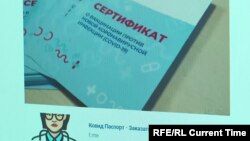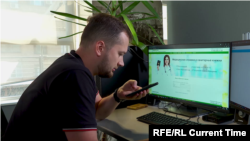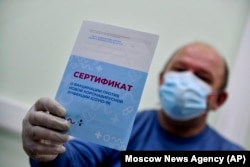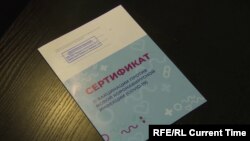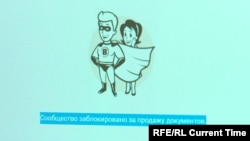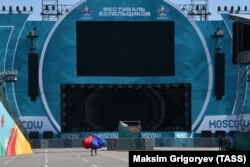Amidst a surge in COVID-19 infections, a black market for counterfeit vaccination certificates has taken firm root in Russia. Whether or not officials can root it out remains, as yet, unclear.
The incentives for doing so, however, number well into the thousands: On June 21, Russia officially recorded 17, 378 fresh COVID-19 infections -- a number that has given it one of the world’s highest infection rates, based on data from the Johns Hopkins Coronavirus Resource Center.
Medical experts stress that vaccination is the most effective way to combat the virus’ spread, but, so far, many Russians remain skeptical. In April, 62 percent of 1,614 respondents told the Levada Center, an independent pollster, that they did not trust Sputnik V, the Russian-made COVID-19 vaccine that is the best known of six domestic and Chinese vaccines available in Russia.
As of June 21, only 10.52 percent of the country’s nearly 146 million inhabitants had been vaccinated against the coronavirus, according to Gogov, a website that tracks COVID-19 data from Russia’s regions and other information sources.
Virologist Konstantin Chumakov, the Russia-born associate director for research at the U.S. Food and Drug Administration’s Office of Vaccines Research and Review, calls Sputnik V a “completely decent” vaccine, but noted that the fact that it began to be used before it had completed its clinical trials “does not inspire confidence in the population.”
A public campaign to emphasize Sputnik V’s merits and criticize Western vaccines also backfired, commented Anna Ozhiganova, a specialist in medical anthropology at the Russian Academy of Sciences.
“[P]eople concluded that if Western vaccines aren’t good, that means that ours, more likely than not, is even worse, even though they don’t tell us this,” Ozhiganova said.
Hence, as the country’s Sputnik V vaccination campaign began to pick up pace at the start of 2021, the first fake vaccination certificates appeared for sale in Moscow.
On March 16, the Russian Interior Ministry announced its first detainee, an unidentified 30-year-old Moscow man who allegedly had fabricated the official certificates for between 4,000 to 5,000 rubles (roughly $55 to $68) each. The case does not appear to have yet gone to trial, but is no longer a solo incident.
On June 18, Moscow police announced that 24 criminal cases had been opened for producing such fake certificates or for related fraud.
Finding dealers in these certificates poses little challenge.
Current Time reporters managed to locate dozens of sites offering COVID-19 vaccination certificates for prices from between $50 to $150. At the lower end of the price scale, customers receive only a paper version of the document; at the higher end, counterfeiters offer to enter it into Russia’s official registry of vaccinated persons.
One such website, which offers “medical certificates and health cards” for sale, did not include a COVID-19 vaccine certificate in its price list, but a sales representative told Current Time over the phone that it could supply such a certificate for 3,000 rubles ($41), paid online.
The next day, a courier delivered the prepared certificate, complete with seals, the address of a St. Petersburg clinic, medical personnel’s signatures, and the numbers of the Sputnik V vials supposedly used for the vaccination.
As a relatively cheap counterfeit, however, this certificate will not appear on the government’s public services portal, which contains the electronic versions of legitimate vaccination certificates.
Individuals who use fake vaccination certificates face a potential fine of up to 80,000 rubles (roughly $1,094) or six months in prison. The fabricators themselves can be sentenced to prison for up to 2 years.
Nonetheless, with obligatory vaccinations becoming more common, demand for these services could increase – particularly in Moscow, a city of some 12 million people, that reported the country’s highest daily infection rate on June 21: 7,584 new cases, more than four times the number of new cases in the Moscow region, which posted the country’s second highest number of new cases (1,811).
To try and slow the virus’ spread, the Moscow Department of Health last week ordered the city’s hospitals to provide routine medical care only to people who have been vaccinated. Human rights activist Ivan Melnikov has asked the Prosecutor General’s office to investigate the order as a potential violation of Russians’ constitutional right to medical care (Article 41).
Further disputes could soon be in the works: On June 19, Labor and Social Welfare Minister Anton Kotyakov stated that employers nationwide may fire unvaccinated staff without pay if the employers’ regions have ordered mandatory vaccinations against COVID-19.
Sixty percent of employees working in government, services, education, health care, public transportation, housing and public utilities, and energy already are required to be vaccinated in Moscow and the Moscow region, as well as the regions of Kemerovo, Leningrad, Sakhalin, Tver, and the southwestern city of Tula. All at-risk individuals in these locations are required to be vaccinated.
Rospotrebnadzor, Russia's public safety monitor, stresses that trend will continue.
Russia’s Krasnodar Krai, a southern region bordering the Black Sea that millions of tourists visit each summer, declared on June 21 that vaccination is obligatory for all residents “working with people.”
“Unfortunately, the current situation leaves us no choice,” the region’s governor, Veniamin Kondratyev, announced on Telegram. On June 21, Krasnodar Krai reported 147 new infections; the eighth highest infection rate among the regions and cities listed on the government’s official coronavirus information site.
Against this backdrop, Moscow contract lawyer Vadim Kudryavtsev predicted a likely “surge in the opening of criminal cases” about counterfeit vaccination certificates, and an increase in [government] checks of medical establishments” issuing vaccination certificates.
To date, hundreds of medical-certificate sites have registered domain names, but have been left “to hibernate,” commented cyber-security expert Yuri Drugach.
Already, some of Russia’s largest online marketplaces have started to block announcements about the sale of vaccination certificates. One such vendor was blocked on the large social-media platform VKontakte even as Current Time was reviewing its content.
On Telegram and not publicly accessible darknet websites, however, such certificate sales still continue unhindered.
In Moscow, a desire for entertainment conceivably could be part of the reason. On June 18, Mayor Sergei Sobyanin decreed that customers with a QR-code that shows they have completed their COVID-19 vaccination will be able to visit restaurants, bars, and nightclubs after 11 p.m. As an experiment, some 100 “COVID-free” eateries will be allowed to operate without face masks or social distancing.
Reverting to a tactic used at the start of the pandemic in 2020, Sobyanin declared June 12-June 21 a work holiday and reintroduced restrictions on large public gatherings.
Over the short run, non-vaccine measures such as face masks, social distancing, and restrictions on gatherings of people can help contain the spread of the virus, but, ultimately, virologist Chumakov stressed, only one long-term solution for this pandemic exists: “Vaccinate, vaccinate, vaccinate.”
-With additional reporting from Interfax, RBC, and TASS




